- Home
- Philip Roth
Nemesis n-4 Page 10
Nemesis n-4 Read online
Page 10
The dining lodge, a large timbered pavilion with open sides only steps along a wooden walkway from Mr. Blomback's lakeside office, was swarming with campers, the girls and their counselors seated at round tables on one side of the main aisle and the boys and their counselors on the other. Outside was the mild warmth of the sun — a sun that seemed benign and welcoming rather than malevolent, a nurturing Father Sun, the good god of brightness to a fecund Mother Earth — and the flickering luster of the lake and the lush green mesh of July's growing things, about which he knew barely any more than he knew about the birds. Inside was the noisy clamor of children's voices reverberating in the spacious lodge, the racket that reminded him of how much he enjoyed being around kids and why it was he loved his work. He'd nearly forgotten what that pleasure was like during the hard weeks of watching out for a menace against which he could offer no protection. These were happy, energetic kids who were not imperiled by a cruel and invisible enemy — they could actually be shielded from mishap by an adult's vigilant attention. Mercifully he was finished with impotently witnessing terror and death and was back in the midst of unworried children brimming with health. Here was work within his power to accomplish.
Mr. Blomback had left him alone with his lunch, saying they'd meet up again when Bucky had finished. In the dining lodge, nobody as yet knew or cared who he was — kids and counselors alike were engaged in a happy frenzy of socializing while they ate, cabinmates talking and laughing, at some tables bursting into song, as though it weren't the hours since breakfast but many years since they'd been together like this. He was searching the tables for Marcia, who herself probably wasn't yet on the lookout for him. On the phone the night before, both had assumed that by the time he was settled into his cabin and got under way at the waterfront, lunch would be long over and that he'd only arrive in the dining lodge at dinnertime.
When he found her table, he was so overjoyed that he had to restrain himself from standing and shouting her name. The truth of it was that during those last three days on the playground he thought he would never see her again. From the moment he'd agreed to the Indian Hill job, he was sure he'd come down with polio and lose everything. But here she was, a strikingly dark-eyed girl with thick, curly, black-black hair that she'd had cut for the summer — there are few true blacks in nature, and Marcia's hair was one of them. Her hair had reached glamorously down to her shoulders when they first met at a faculty get-together to introduce new staff the previous fall. She appealed to him so on that first afternoon that it was a while before, face-to-face, he could look straight into her eyes or could stop himself from ogling her from afar. Then he'd seen her walking assuredly at the head of her silent class, leading her pupils through the corridors to the auditorium, and he fell for her all over again. That the kids called her Miss Steinberg mesmerized him.
Now she was deeply tanned and wearing a white camp polo shirt like his, which only enhanced the darkness of her good looks, and specifically of those eyes, whose irises struck him as not only darker but rounder than anyone else's, two dream targets, their concentric circles colored brownish black. He'd never seen her any prettier, even if she looked less like one of the counselors than like one of the campers, barely resembling the tastefully dressed first-grade teacher who already, at twenty-two, carried herself with the outward composure of an experienced professional. He noticed that her girlish little nose was dabbed with a white ointment and wondered which she was treating, sunburn or poison ivy. And then he had the most cheering thought: That's what you worried about up here, that's what you warned the children about — poison ivy!
There was no way to get Marcia's attention in the midst of the dining lodge hubbub. Several times he raised an arm in the air, but she did not see him, even though he held his hand aloft and waved it about. Then he saw Marcia's sisters, the Steinberg twins, Sheila and Phyllis, sitting side by side several tables away from Marcia. They were eleven now and looked entirely unlike their older sister, freckled youngsters with frizzy reddish hair and long, painfully skinny legs and noses already evolving like their father's, and both already nearly as tall as Marcia. He waved in their direction, but they were talking animatedly with the girls at their table and they didn't see him either. From the moment he'd met them he'd been completely won over by Sheila and Phyllis, their vivacity, their intelligence, their intensity, even by the ungainliness that had begun to overtake them. I am going to know these two for the rest of my life, he thought, and the prospect filled him with enormous pleasure. We will all be part of the same family. And then, all at once, he was thinking of Herbie and Alan, who had died because they'd spent the summer in Newark, and of Sheila and Phyllis, kids almost the same age who were flourishing because they were spending the summer at Indian Hill. And then there were Jake and Dave, fighting the Germans somewhere in France while he was ensconced in this noisy funhouse of a summer camp with all these exuberant kids. He was struck by how lives diverge and by how powerless each of us is up against the force of circumstance. And where does God figure in this? Why does He set one person down in Nazi-occupied Europe with a rifle in his hands and the other in the Indian Hill dining lodge in front of a plate of macaroni and cheese? Why does He place one Weequahic child in polio-ridden Newark for the summer and another in the splendid sanctuary of the Poconos? For someone who had previously found in diligence and hard work the solution to all his problems, there was now much that was inexplicable to him about why what happens, happens as it does.
"Bucky!" The twins had spotted him and, above the din, were calling across to him. They were standing by their table and waving their arms. "Bucky! You made it! Hurray!"
He waved back and the twins began pointing excitedly toward where their sister was sitting.
He smiled and mouthed "I see, I see" while the twins called to Marcia, "Bucky's here!"
Marcia stood to look around, so he stood too, and now at last she saw him, and with both of her hands she threw him a kiss. He was saved. Polio hadn't beaten him.
HE SPENT the afternoon at the waterfront, watching as the counselors there — high school boys of seventeen, who hadn't yet reached draft age — put the campers through their swimming drills and exercises. There was nothing that wasn't familiar to him from the Teaching Swimming and Diving course he'd taken at Panzer. He looked to have inherited a beautifully run program and a perfect environment to work in — not an inch of the waterfront looked neglected, the docks, piers, platforms, and diving boards were all in superb condition, and the water was dazzlingly clear. Wooded hills thick with trees rose steeply all along the edge of the lake. The campers' cabins were tucked into low hills on the near side of the lake, the girls' camp beginning at the end of one wing of the dining lodge and the boys' at the other. About a hundred yards out there was a small wooded island covered with slanting trees whose bark appeared to be white. This must be the island where Marcia had said they could go to be safely alone.
She had managed to leave a note for him with the secretary at Mr. Blomback's office: "I couldn't believe my eyes, seeing my future husband here. I can get off at 9:30. Meet you outside the dining lodge. As the kids like to say, 'You send me.' M."
When the last of the swimming classes was over and the campers returned to their cabins to get ready for Friday night dinner and the movie that would follow, Bucky remained alone at the waterfront, delighted by how his first hours on the job had gone and elated by the company of all these unworried, wonderfully active children. He'd been in the water getting to know the counselors and how they worked and helping the kids with their strokes and their breathing, so he hadn't a chance to step out on the high board and dive. But all afternoon he'd been thinking about it, as if when he took that first dive he would be truly here.
He walked out along the narrow wooden pier that led to the high board, removed his glasses, and set them at the foot of the ladder. Then, half blind, he climbed to the board. Looking out, he could see his way to the edge of the board but distinguish little beyond tha
t. The hills, the woods, the white island, even the lake had disappeared. He was alone on the board above the lake and could barely see a thing. The air was warm, his body was warm, and all he could hear was the pock of tennis balls being hit and the occasional clank of metal on metal where some campers off in the distance were pitching horseshoes and striking the stake. And when he breathed in, there was nothing to smell of Secaucus, New Jersey. He filled his lungs with the harmless clean air of the Pocono Mountains, then bounded three steps forward, took off, and, in control of every inch of his body throughout the blind flight, did a simple swan dive into water he could see only the instant before his arms broke neatly through and he plumbed the cold purity of the lake to its depths.
AT FIVE FORTY-FIVE, he was nearing the entrance to the dining lodge with the boys from his cabin when two campers broke away from a crowd of girls drifting in with their counselors and began calling his name. They were the Steinberg girls, twins so alike that, even up close, he had trouble telling them apart. "It's Sheila! It's Phyllis!" he cried as they hurled themselves into his arms. "You two look terrific," he said. "Look how dark you are. And you've grown again. Darn it, you're as tall as I am." "Taller!" they shouted, squirming all over him. "Oh, don't say that," Bucky said, laughing, "please, not taller already!" "Are you going to put on a diving exhibition?" one of them said. "Nobody's asked me to so far," he replied. "We're asking you to! A diving exhibition for the whole camp! All those twisting and backward things that you do in the air."
The girls had seen him dive a couple of months back, when he'd been invited down the shore to the Steinbergs' summer home in Deal for the Memorial Day weekend, and they'd all gone together to the swim club at the beach where the Steinbergs were members. It was the first time he'd been an overnight guest of the family's, and once he'd put aside his jitters about what someone of his background might talk about with such educated people, he found that Marcia's mother and father couldn't have been more kind and companionable. He remembered the pleasure he had taken in giving the twins basic instruction, at the low board of the swimming pool, on balancing themselves and taking off. They were timid to begin with, but by the end of the afternoon he had them doing straight dives off the board. By then he was their matinee idol, and they would wrest him from their older sister at every opportunity. And he was taken with them, the girls Dr. Steinberg appreciatively referred to as his "identically sparkling duo."
"I missed you two," he said to the twins. "Are you staying for the rest of the summer?" they asked. "I sure am." "Because Mr. Schlanger went into the army?" "That's right." "That's what Marcia said, but at first we thought she was dreaming." "I think I'm dreaming, being here," Bucky replied. "I'll see you girls later," he said, and, showing off for their cabinmates, they each lifted their faces to kiss him demonstratively on the lips. And, as they ran for the dining lodge entrance, no less demonstratively, they called, "We love you, Bucky!"
He ate next to the Comanche cabin counselor, Donald Kaplow, a seventeen-year-old who was a track-and-field enthusiast and threw the discus for his high school. When Bucky told him that he threw the javelin, Donald said that he had brought his equipment with him to camp, and whenever he had time off he practiced his throws in an open hayfield back of the girls' camp, where they held the big Indian Pageant in August. He wondered if Bucky would come along sometime to watch and give him some pointers. "Sure, sure," said Bucky.
"I watched you this afternoon," Donald said. "From the porch of our cabin you can see the lake. I watched you dive. Are you a competitive diver?"
"I can do the elementary competitive dives, but, no, I'm not a competitor."
"I never got my dives down. I repeat all kinds of ridiculous mistakes."
"Maybe I can help," Bucky said.
"Would you?"
"If there's time, sure."
"Oh, that's great. Thanks."
"We'll take them one by one. All you probably need are a few faults corrected and you'll be fine."
"And I'm not hogging your time?"
"Nope. If and when I have the time, it's yours."
"Thanks again, Mr. Cantor."
When he looked over to the girls' side of the dining lodge to see if he could find Marcia, he caught the eye of one of the Steinberg twins, who frantically waved her arm at him. He smiled and waved back and realized that in less than a day he had rid himself of his polio thoughts, except for a few minutes earlier, when he was reminded by Donald of Alan Michaels. Though Donald was five years older and already six feet tall, they were both nice-looking boys with broad shoulders and lean frames and long, strong legs, both avid to latch on to an instructor who could help them improve themselves at sports. Boys like Alan and Donald, seeming to sense right off the depth of his devotion to teaching and his capacity to give them assurance where they needed it, were quickly drawn into his mentoring orbit. Had Alan lived, he more than likely would have grown into an adolescent much like Donald Kaplow. Had Alan lived, had Herbie Steinmark lived, Bucky more than likely wouldn't be here and the unimaginable wouldn't be happening at home.
HE AND MARCIA canoed across the lake — he'd never been in a canoe before, but Marcia showed him how to handle the paddle, and watching her, he picked it up after only a few strokes. They moved slowly into the dark, and when they reached the narrow island, which was far longer than he'd realized at the boys' waterfront, they steered around to the far side, where they dragged the canoe ashore and pulled it back into a small grove of trees. They had hardly spoken from the time they touched hands outside the dining lodge and hurried over to the girls' waterfront to silently lift a canoe from the rack there.
There was no moon, no stars, no light except from a few of the cabins on the hillside back on shore. There had been the roast beef dinner in the dining lodge — where Donald Kaplow, with a boy's voracious appetite, had downed slice after slice of juicy red meat — and now there was a movie playing in the rec hall for the older kids, so the only sound that carried from the camp was the distant noise of the movie track. Close by they could hear the orchestral thrumming of frogs, and from far away a long rumble of thunder was audible every few minutes. The drama of the thunder didn't make their being alone together on the wooded island in their khaki shorts and camp polo shirts any less momentous or diminish the stimulus of their scanty clothes. Their arms and legs bare, they stood in a little cleared patch in among the trees, the two so close to each other that he could plainly see her despite the dark. Marcia, on her own, had gone out in the canoe and prepared the clearing a few nights earlier, readying the spot for their rendezvous by using her hands to rake away the leaves that had piled up the previous fall.
All around them the island was thickly packed with clusters of trees, which weren't entirely white, as they had looked to him from the waterfront, but bore black slashes encircling their bark as though they'd been scarred by a whip. The trunks of a number of them were bent or broken, some growing almost doubled over, some jaggedly torn apart halfway to the ground, some completely sheared off, ravaged by the weather or disease. The trees still intact were so elegantly slender that he could have wrapped his fingers around any one of them with as little difficulty as when he playfully clasped one of Marcia's thighs in the ring of his ten strong fingers. The upper branches and drooping branchlets of the undamaged trees spanned the clearing, creating a latticed dome of saw-toothed leaves and delicately thin, overarching limbs. It was a perfect hideaway, sequestration such as they could only dream about while, necking heavily on the Steinbergs' front porch, they attempted to muffle those readily identifiable noises that signal arousal, intense pleasure, and climax.
"What do you call these trees?" he asked, putting his hand out to touch one. All at once, he had become inexplicably shy, just as when they had been introduced at that first faculty get-together and he found himself moving woodenly and with a ridiculously unnatural expression on his face. She had surprised him by extending her little hand to shake, and he was so befuddled that he wasn't sure what to do
with it — the allure of her petite figure left him unable even to think of how to address her. The encounter had been colossally embarrassing for someone whose grandfather had raised him to believe that he must consider nothing beyond his strength to undertake, least of all saying hello to a girl who probably didn't weigh a hundred pounds.
"Birches," she answered. "They're white birches — silver birches."
"Some of the bark is peeling away." He easily stripped a swatch of thin silvery bark from the tree trunk under his hand and showed it to her, there in the dark, as though they were children on a nature hike.
"The Indians used birch bark for canoes," she told him.
"Of course," he said. "Birch bark canoes. I never thought it was the name of a tree."
There was silence between them while they listened to the mumble of the movie voices floating over the water and the thunder far away and the frogs nearby and the thud of something across the lake knocking against the swimming dock or the piers. His heartbeat quickened when he realized it could be Mr. Blomback, coming after them in another canoe.
"Why are there no birds out here?" he asked finally.
"There are. Birds don't sing at night."
"Don't or do?"
"Oh, Bucky," she whispered beseechingly, "must we really go on like this? Undress me, please. Undress me now."
After their weeks of separation, he had needed her to tell him that. He needed this intelligent girl to tell him everything, really, about life beyond the playground and the athletic field and the gym. He needed her entire family to tell him how to live a grown man's life in all the ways that nobody, including his grandfather, had yet done.
Instantly he undid the belt and the buttons on her shorts and slid them down over her legs to the ground. Meanwhile, she raised her arms like a child, and first he took the flashlight she was carrying out of her hand and then he gently pulled the polo shirt off over her head. She reached around to unhook her bra while he knelt and, with the bizarre, somewhat shaming sensation that he had lived for this moment, pulled her underpants down her legs and off over her feet.

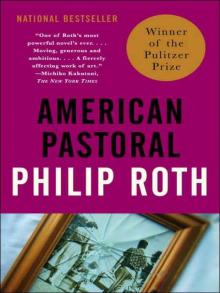 American Pastoral
American Pastoral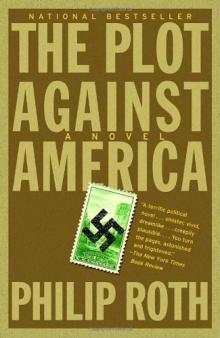 The plot against America
The plot against America The Human Stain
The Human Stain Nemesis n-4
Nemesis n-4 Sabbath’s Theater
Sabbath’s Theater The Professor of Desire
The Professor of Desire Our Gang
Our Gang The Breast
The Breast Operation Shylock
Operation Shylock The Dying Animal
The Dying Animal Letting Go
Letting Go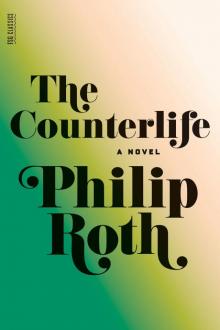 The Counterlife
The Counterlife Everyman
Everyman Nemesis
Nemesis Exit Ghost
Exit Ghost Portnoy's Complaint
Portnoy's Complaint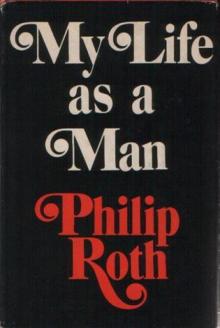 My Life as a Man
My Life as a Man I Married a Communist
I Married a Communist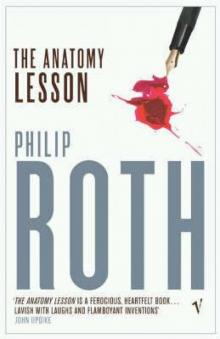 The Anatomy Lesson
The Anatomy Lesson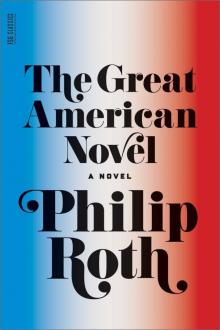 The Great American Novel
The Great American Novel Shop Talk
Shop Talk The Humbling
The Humbling Zuckerman Unbound
Zuckerman Unbound When She Was Good
When She Was Good The Prague Orgy
The Prague Orgy American Pastoral (Nathan Zuckerman)
American Pastoral (Nathan Zuckerman) Goodbye, Columbus
Goodbye, Columbus Reading Myself and Others
Reading Myself and Others